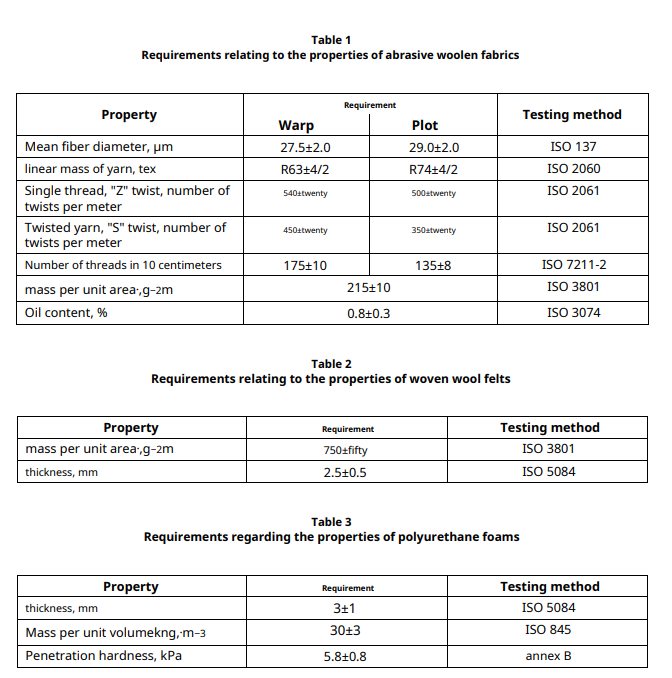TEXTILES. DETERMINATION OF THE ABRASION RESISTANCE OF FABRICS BY THE MARTINDALE METHOD.
PART 1: MARTINDALE ABRASION TESTING APPARATUS
TEXTILES. DETERMINATION OF THE ABRASION RESISTANCE OF FABRICS BY THE MARTINDALE METHOD.
PART 1: MARTINDALE ABRASION TESTING APPARATUS
This part of ISO 12947 specifies requirements for the Martindale abrasion apparatus and auxiliary materials to be used in the test methods specified in parts 2 to 4 of ISO 12947 for the determination of strength to fabric abrasion.
This part of ISO 12947 applies to the following fabric testing devices:
For the purposes of this part of ISO 12947, the following definitions apply:
1 Abrasive Friction: Complete revolution of the two outer transmission elements of the Martindale abrasion tester.
2 Abrasion cycle: execution of all the abrasive movements in translation which form a Lissajous curve comprising 16 frictions, i.e. 16 cycles of the two external transmission elements, and 15 cycles of the internal transmission element of the device test. Martindale abrasion.
3 Control interval: Number of continuous rubbings.
4 Lissajous Curve: A curve generated by motion that starts out as a circle and gradually becomes ellipses that narrow to a straight line, from which ellipses widen further and further in opposite directions diagonally, before to repeat the drawing again.
5 Workstation: Abrasion plate
A circular specimen is subjected, by means of the Matindale abrasion tester, to a defined load and to the action of friction with an element, according to a translational movement forming a Lissajous curve.
At the same time, the sample holder, provided either with the sample or with the abrasive element depending on the method used, rotates freely around its own axis, perpendicular to the horizontal plane.
The specimen is subjected to abrasive wear during a previously determined number of rubs.


This website uses cookies so that we can provide you with the best user experience possible. Cookie information is stored in your browser and performs functions such as recognising you when you return to our website and helping our team to understand which sections of the website you find most interesting and useful.
Strictly Necessary Cookie should be enabled at all times so that we can save your preferences for cookie settings.
If you disable this cookie, we will not be able to save your preferences. This means that every time you visit this website you will need to enable or disable cookies again.
This website uses Google Analytics to collect anonymous information such as the number of visitors to the site, and the most popular pages.
Keeping this cookie enabled helps us to improve our website.
Please enable Strictly Necessary Cookies first so that we can save your preferences!